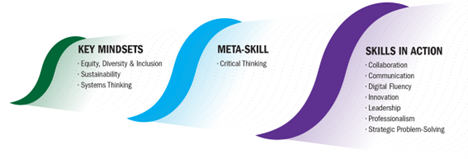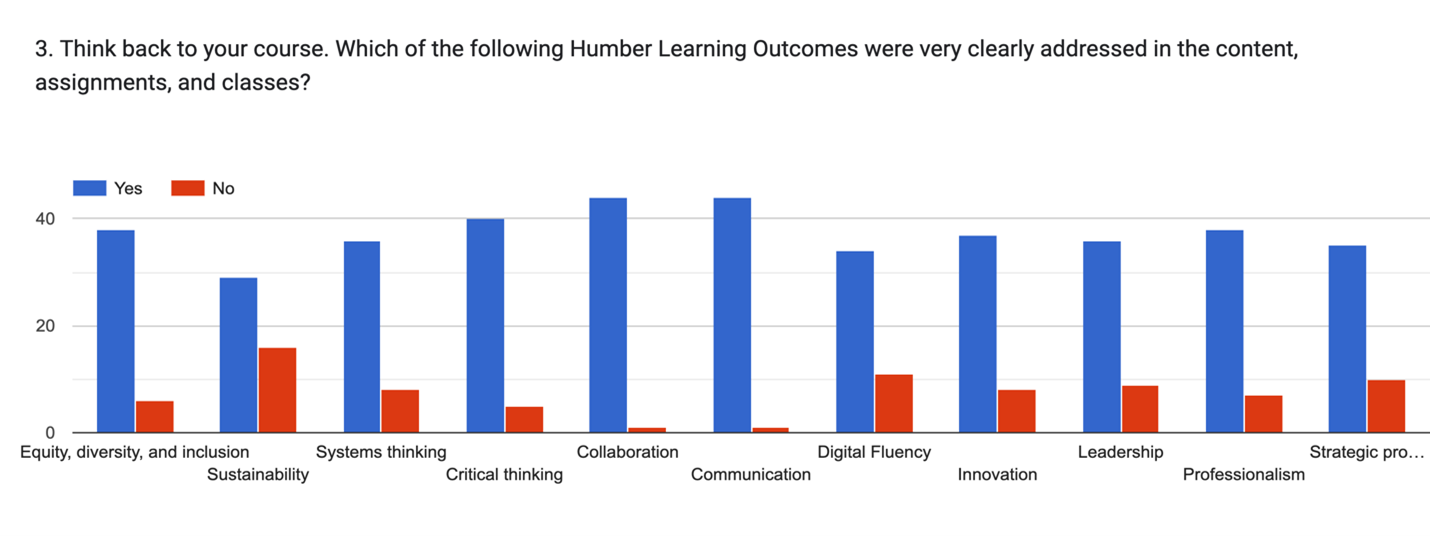Empowering Students to Become Career-Ready Citizens Using a Skills and Mindsets Framework

The rapid advancement of technology and the future of work have increased pressure on the knowledge and skillsets needed for success in the workplace. Social, political, and economic challenges highlighted by COVID-19 and changing global political landscapes have further solidified the need for graduates to be adaptable learners with the mindsets to solve complex problems. Initiated in 2017, Humber College Institute of Technology and Advanced Learning’s Institutional Learning Outcomes project (Humber Learning Outcomes or HLOs) highlights the key mindsets and skills that empower students to think critically, make bold choices, and become career-ready citizens.
Much of Humber’s programming has addressed the three key mindsets, one meta-skill, and seven core skills that make up the Humber Learning Outcomes Framework. Despite this, students have been unsure about how they were developing these competencies and how to articulate the value they have to a potential workplace or educational institution. By focusing on constructive alignment among learning outcomes, learning activities, and assessments, the Humber Learning Outcomes project aims to help students draw connections between courses and learning experiences, and gain the confidence to articulate their mindset and skills development.
Institutional Directive
The Humber Learning Outcomes project was initiated to address one of the goals of Humber’s 2016-2021 Academic Plan: “Ensure that all Humber graduates are able to demonstrate mastery of essential employability skills through development and implementation of an institutional learning outcome framework.” After preliminary work in 2017, the initiative was also written into Humber’s 2018-2023 Strategic Plan as a supporting action to Pillar 1: Career-Ready Citizens.
This institutional directive has been instrumental in the success of the HLOs to date. A systems approach in which faculty and student support services work at the ground level integrating the HLOs while the project is championed by leadership has resulted in widespread support and eagerness to work with the HLOs and help to improve the student learning experience at the college.
Preliminary Work
The Humber Learning Outcomes project began with research. Similar frameworks—frequently called institutional learning outcomes, graduate profiles, or graduate attributes—existed globally and an environmental scan of over 200 English-speaking postsecondary institutions provided the project with foundational themes. Common across these frameworks were skills such as communication, collaboration, critical thinking, problem-solving, and ethical practice.
An extensive series of internal and external consultations helped to develop the initial framework and shape it into a series of skills and mindsets that align with the values of the Humber community. The project team conducted 23 consultations in 2017-2018, including eight solely for students and five for industry partners. Internally, there were consultations held for student engagement staff, faculty, and placement advisors; the institutional learning outcomes were also discussed at a senior leadership retreat. Industry partners from across disciplines were invited to a public forum, and consultations with Program Advisory Committees from several programs took place. General student consultations were held, with participation recognized in the cocurricular record. The project team also consulted with historically disadvantaged students through Indigenous Education and Engagement, Black Student Support and Engagement, and the LGBTQ+ Resource Centre.
The consultations posed the following questions:
- What core 21st century skills, competencies, and mindsets do students need to be successful?
- How can graduates effectively articulate/demonstrate core skills, competencies, and mindsets to employers?
Students were asked not only what skills they believed were crucial for their future success, but also what skills they felt they needed but were not learning in their programs. Industry partners were asked to consider how workplaces were changing as well as the impact of those changes. The answers to these questions were both expected and surprising; the project team discovered that students were incredibly in tune with what their future workplaces would require of them.
The consultations revealed that, in addition to technical skills related to the actual sector, industry was looking for what used to be called soft skills, such as communication, collaboration, agility, adaptability, and problem-solving. They also showed a desire for employees who possessed empathy, embraced diversity, and valued sustainability.
The results of the consultations were organized into buckets of similar concepts. An analysis of these concepts revealed that they did not all function in the same way, and an initial framework with three categories was drafted. The framework included:
- Key mindsets – perspectives based on values, such as sustainability or equity, diversity, and inclusion (EDI);
- Meta-skills – higher order skills that facilitate the use and acquisition of other skills, such as critical thinking; and
- Core skills – action skills such as communication or collaboration.
The HLO Framework and Launch
The consultation and research phase led to the development of a framework built around three mindsets (EDI, sustainability, and systems thinking), a meta-skill (critical thinking), and seven skills in action (collaboration, communication, digital fluency, innovation, leadership, professionalism, and strategic problem-solving). With definitions, key concepts, and keywords, the Humber Learning Outcomes framework includes all of the feedback provided from all 23 consultations in an integrative format.
This framework was shared at the League for Innovation in the Community College’s 2019 Innovations Conference in a presentation titled, “Building Institutional Learning Outcomes Readiness.” The presentation focused on the consultation process along with the project's commitment to inclusivity of perspectives and of encouraging both academic and nonacademic departments to adopt the framework when engaging with students and student learning.
Figure 1: HLO Framework

Humber launched its HLO Framework in 2020 with a live event featuring over 100 participants, including Humber students, faculty, and staff and industry and international partners. The focus of the event was sustainability and the future of work. In addition to an introduction to the framework, there were a variety of workshops, including “Go for the Goals: Sustainable Development Goals Workshop,” “Projects with International Partners from Humber’s Polytechnic Alliance,” and “Disaster Relief: Packing Family Emergency Kits.” To honour Humber’s commitment to sustainability, the event featured environmentally conscious food options and efforts were made to minimize the event’s footprint.
Embedding Humber Learning Outcomes Into Programming
Since launching in 2020, the HLOs have been embedded into academic and nonacademic program areas.
Academic Programming
The HLOs were integrated into the summer 2022 Global Summer School (GSS). GSS is a program offered by Humber International in collaboration with the six Academic Faculties. Six Humber courses are offered in a condensed three-week format. The cohort was formed of 144 students representing 35 different nationalities from 14 academic institutions, including Humber.
The faculty wove the HLO skills and mindsets into their courses, mapping their course learning outcomes to the HLOs and incorporating HLO language into delivery and assessment to provide students with the terminology to articulate the mindsets and skills they acquired while at Humber. Faculty feedback indicated that the integration of the HLOs did not require a great deal of time or effort. An anonymous survey yielded the following responses: “It was not challenging to incorporate the HLOs (I had to do a little tweaking, but not extensively)” and “I do feel that aligning the course with the HLOs better enabled the students to learn/engage and gain skills required.”
Students were surveyed on their knowledge of the HLO mindsets and skills prior to and after the course, and their feedback was very positive. Students indicated that all of the HLO mindsets and skills were clearly addressed in the curriculum, as is shown in Figure 2. Students were also asked to rate their confidence in their grasp of each of the skills and mindsets. The majority of students—between 57 and 84 percent across all categories—rated their confidence as “strong,” with collaboration, communication, and critical thinking ranking the highest of the skills and EDI ranking the highest of the mindsets.
Figure 2: Survey of Students After the GSS

The HLOs were also used by Academic Faculties to build various frameworks that incorporated the skills and mindsets. Humber Global used the HLO framework as a basis for the Beyond COVID-19: Global Systems Gap Challenge. Together, teams of students across the globe work to identify a problem on which to conduct applied research using a systems thinking approach. At the end of the experience, students are able to articulate their skills using the HLOs. The faculty of Health Sciences and Wellness used the HLO framework to develop their Interprofessional Education framework. Groups of students from across the faculty’s 27 programs work collaboratively to help each other think critically and solve problems. For example, a group of Early Childhood Education students recently worked with a group of Nutrition students to help them determine how to deliver nutritional information to children in an age-appropriate manner (i.e., not the PowerPoint presentations that the students had initially prepared for a class of four-year-olds). In turn, the Nutrition students worked with the Early Childhood Education students to help them plan healthy meals for children.
Nonacademic Programming
A variety of nonacademic areas also used the HLOs as the basis for their frameworks and programming:
- Humber International built their Collaborative Online International Learning outcomes using the HLOs;
- The Humber Arboretum used the HLOs to update the outcomes for their Learning by Leading student leadership program; and
- Student Success and Engagement has created their new Student Wellness and Equitable Learning Curricular Framework in alignment with the HLOs. They piloted the framework during the fall 2022 semester and launched in January 2023.
Looking Ahead
In winter 2023, Humber will continue to implement HLOs in the academic curriculum. The HLOs will be embedded into quality assurance processes, including the program review process. As a pilot, the HLOs are being integrated into the self-study document which six programs are currently preparing for program review in spring 2023. Of Humber’s five Centres of Innovation, two have actively embedded the HLOs into their student projects and activities. Over the winter, the remaining three will endeavor to make the HLO skills and mindsets more visible to the students. The project team has worked with Humber’s Indigenous Education and Engagement office to create an Indigenous Knowledges mindset, which will roll out to faculty in winter 2023. The team is also working with Humber’s Office of Research and Innovation to create a tool for measuring students’ skills development.
In May and June 2023, all faculty will map their program learning outcomes, course learning outcomes, and assessments to the HLOs, and brainstorm ways of increasing HLO content and language in their curriculum. This work will be supported by a series of toolkits, exemplars, and rubrics which are currently under development. At the end of June, faculty will have completed updates to their course outlines, indicating which HLO mindsets and skills are covered in each course across the program.
The college plans to relaunch the HLO framework in fall 2023 with the Indigenous Knowledges mindset. The goal is that by 2024, (1) the HLOs will be integrated into all courses, and (2) students will be able to reflect upon, identify, and articulate the skills and mindsets they have developed at Humber as they prepare to enter the workforce and become tomorrow’s leaders.
Lead image: Humber students putting the Humber Learning Outcomes into practice for a class project
Sarah Nieman is Project Manager and Lisa Salem-Wiseman is Associate Dean and Special Advisor, Humber Learning Outcomes, at Humber College Institute of Technology and Advanced Learning in Toronto, Ontario, Canada.
Opinions expressed in Innovation Showcase are those of the author(s) and do not necessarily reflect those of the League for Innovation in the Community College.










